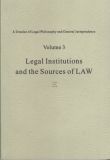用户登陆搜 索 |
查看图书
图书目录:A Note on the Authors
Preface Chapter 1 - Introduction Chapter 2- Legislation 2.1. Introduction 2.~2. Legislation as a Source of Law 2.2.1. Sources of Legislation vs. Legislation as a Source of Law 2.2.2. What Counts as Legislation? 2.2.3. Codification vs. Consolidation 2.2.4. StatutoryInterpretation 2.2.5. Legislation and Common Law 2.2.6. Legislation vs. Adjudication 2.3. Legislation vs. Sovereignty 2.4. Taking Legislation Seriously 2.5. Conclusion Chapter 3 - Precedent 3.1. A Characterization of Precedent 3.2. The Functioning of Precedent in Law 3.2.1. The Doctrine of Stare Dec/sis 3.2.2. Binding vs. Persuasive Precedent 3.2.3. The Ratio Decidendi of a Precedent 3.3. Precedent and Legislation 3.4. The Modal/ties of Binding Precedent 3.4.1. Precedent and Logical Necessity 3.4.2. Precedent and Rule-scepticism 3.4.3. Precedent and Judicial Comity 3.5. Precedent, Bindingness, and Ruleness 3.5.1. Precedent and Hart's Social Rules 3.5.2. Precedent, Wittgenstein and Rule- following 3.5.2.1. Wittgenstein and Following a Rule 3.5.2.2. Precedent and Following a Rule 3.6. The Justification of Precedent 3.6.1. Introduction 3.6.2. The Structure of Stare Decisis 3.6.3. The Justification of Precedent Chapter 4 - Custom 4.1. Historical Foundations of Custom as a Source of Law 4.1.1. From Social Norm to Common Law 4.1.2. General Custom and Local Custom 4.2. The Conceptual Framework for Custom 4.3. The Common Law Rules for the Validity of Custom 4.4. Puzzles Concerning Custom as a Source of Law 4.4.1. Reasonableness 4.4.2. Derivation and Abrogation Chapter 5 - Delegation 5.1. Introduction 5.2. Labour Arbitration 5.2.1. A Sketch of Labour Arbitration Law 5.2.2. Res Judicata & Collateral Estoppel 5.2.2.1. Statement of the Principle 5.2.2.2. Status Under Arbitration Jurisprudence 5.2.2.3. Emergence of the Principles 5.2.2.4. Assessment 5.2.3. Stare Decisis 5.2.3.1. Statement of Principle 5.2.3.2. Status Under Arbitration Jurisprudence 5.2.3.3. Emergence of "Quasi-stare decisis" in Arbitration Jurisprudence 5.2.3.4. Assessment 5.2.4. Conclusion 5.3. Mediation 5.3.1. Introduction 5.3.2. The Saskatcbewan Farm Security Act 5.3.2.1. The Provisions of the Act 5.3.2.2. Assessment 5.3.3. The Alberta Human Rights Act 5.3.3.1. The Provisions of the Act 5.3.3.2. Assessment 5.3.4. Other Examples of Mediation 5.4. Conclusion Chapter 6- Constitutions 6.1. Definitional Issues 6.1.1. The "Thin" Sense of "Constitution" 6.1.2. The "Thick" Sense of "Constitution" 6.1.3. Constitutional Conventions 6.1.4. Prima Facie Grounds for Constitutions as Sources of Law 6.1.5. The Fundamental Challenge 6.2. The Supreme Court of Canada and "Reading in" 6.3. The High Court of Australia and Implied Rights 6.4. The Supreme Court of Canada and Unwritten Constitutional Law 6.4.1. Unwritten Principles as Fundamental Law 6.4.2. New Brunswick Broadcasting 6.4.3. The Provincial Judges Case 6.4.4. The Quebec Secession Case 6.5. Conclusions Chapter 7- Sources of Law in the Civil Law (by Antonino Rotolo) 7.1. Introduction. The Theoretical Framework: Basic Concepts on the Sources of Law in Continental Legal Doctrine 7.2. Constitution and Legislation 7.2.1. The Historical Background: The Rechtsstaat and the Paradigm of Legislation in Continental Legal Doctrine 7.2.2. The Change of Paradigm: Contemporary Constitutional Democracies 7.3. Other Sources of Law 7.3.1. Some Notes on Private Autonomy and Precedent 7.3.1.1. Private Autonomy 7.3.1.2. Judicial Decision and Precedent 7.3.2. Custom 7.3.3. The Role of EC/EU Law: A Sketch Chapter 8 - International Law 8.1. Introduction 8.2. Article 38 8.3. Treaties 8.4. Customary International Law 8.4.1. Introduction 8.4.2. State Practice 8.4.3. Opinio Juris 8.5. General Principles 8.51 General Principles of Municipal Law 8.52 Jus Cogens 8.6. Conclusion Chapter 9- Authority 9.1. Deeply and Contextually Justified Authority: First Thoughts 9.2. The Authority of Ancient Manuscripts 9.3. Interpretive Authority 9.4. Ancient Authorities Revisited 9.5. Legal Authorities Revisited 9.6. Post-post-modernist Conclusions Bibliography Index of Subjects Index of Names |

